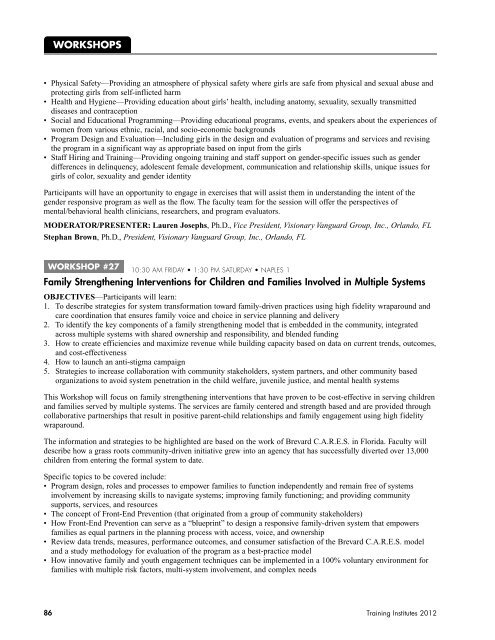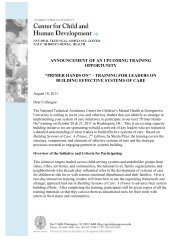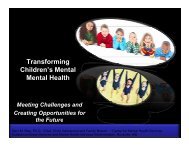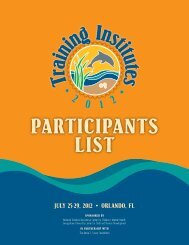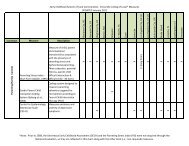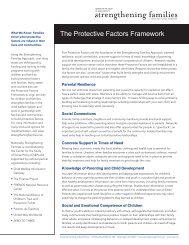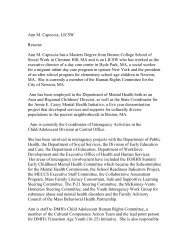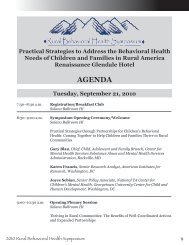Training Institutes 2012 - National Technical Assistance Center for ...
Training Institutes 2012 - National Technical Assistance Center for ...
Training Institutes 2012 - National Technical Assistance Center for ...
You also want an ePaper? Increase the reach of your titles
YUMPU automatically turns print PDFs into web optimized ePapers that Google loves.
WORKSHOPS<br />
• Physical Safety—Providing an atmosphere of physical safety where girls are safe from physical and sexual abuse and<br />
protecting girls from self-inflicted harm<br />
• Health and Hygiene—Providing education about girls’ health, including anatomy, sexuality, sexually transmitted<br />
diseases and contraception<br />
• Social and Educational Programming—Providing educational programs, events, and speakers about the experiences of<br />
women from various ethnic, racial, and socio-economic backgrounds<br />
• Program Design and Evaluation—Including girls in the design and evaluation of programs and services and revising<br />
the program in a significant way as appropriate based on input from the girls<br />
• Staff Hiring and <strong>Training</strong>—Providing ongoing training and staff support on gender-specific issues such as gender<br />
differences in delinquency, adolescent female development, communication and relationship skills, unique issues <strong>for</strong><br />
girls of color, sexuality and gender identity<br />
Participants will have an opportunity to engage in exercises that will assist them in understanding the intent of the<br />
gender responsive program as well as the flow. The faculty team <strong>for</strong> the session will offer the perspectives of<br />
mental/behavioral health clinicians, researchers, and program evaluators.<br />
MODERATOR/PRESENTER: Lauren Josephs, Ph.D., Vice President, Visionary Vanguard Group, Inc., Orlando, FL<br />
Stephan Brown, Ph.D., President, Visionary Vanguard Group, Inc., Orlando, FL<br />
WORKSHOP #27 10:30 AM FRIDAY • 1:30 PM SATURDAY • NAPLES 1<br />
Family Strengthening Interventions <strong>for</strong> Children and Families Involved in Multiple Systems<br />
OBJECTIVES—Participants will learn:<br />
1. To describe strategies <strong>for</strong> system trans<strong>for</strong>mation toward family-driven practices using high fidelity wraparound and<br />
care coordination that ensures family voice and choice in service planning and delivery<br />
2. To identify the key components of a family strengthening model that is embedded in the community, integrated<br />
across multiple systems with shared ownership and responsibility, and blended funding<br />
3. How to create efficiencies and maximize revenue while building capacity based on data on current trends, outcomes,<br />
and cost-effectiveness<br />
4. How to launch an anti-stigma campaign<br />
5. Strategies to increase collaboration with community stakeholders, system partners, and other community based<br />
organizations to avoid system penetration in the child welfare, juvenile justice, and mental health systems<br />
This Workshop will focus on family strengthening interventions that have proven to be cost-effective in serving children<br />
and families served by multiple systems. The services are family centered and strength based and are provided through<br />
collaborative partnerships that result in positive parent-child relationships and family engagement using high fidelity<br />
wraparound.<br />
The in<strong>for</strong>mation and strategies to be highlighted are based on the work of Brevard C.A.R.E.S. in Florida. Faculty will<br />
describe how a grass roots community-driven initiative grew into an agency that has successfully diverted over 13,000<br />
children from entering the <strong>for</strong>mal system to date.<br />
Specific topics to be covered include:<br />
• Program design, roles and processes to empower families to function independently and remain free of systems<br />
involvement by increasing skills to navigate systems; improving family functioning; and providing community<br />
supports, services, and resources<br />
• The concept of Front-End Prevention (that originated from a group of community stakeholders)<br />
• How Front-End Prevention can serve as a “blueprint” to design a responsive family-driven system that empowers<br />
families as equal partners in the planning process with access, voice, and ownership<br />
• Review data trends, measures, per<strong>for</strong>mance outcomes, and consumer satisfaction of the Brevard C.A.R.E.S. model<br />
and a study methodology <strong>for</strong> evaluation of the program as a best-practice model<br />
• How innovative family and youth engagement techniques can be implemented in a 100% voluntary environment <strong>for</strong><br />
families with multiple risk factors, multi-system involvement, and complex needs<br />
86 <strong>Training</strong> <strong>Institutes</strong> <strong>2012</strong>


